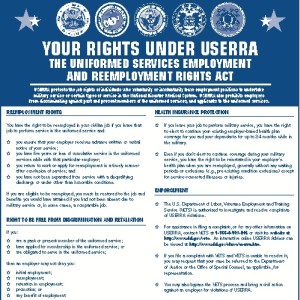 The Uniformed Services Employment and Reemployment Rights Act (USERRA) clarifies and strengthens the Veterans’ Reemployment Rights (VRR) Statute and is monitored by the Department of Labor. USERRA protects civilian job rights and benefits for veterans and members of Reserve components. USERRA also makes major improvements in protecting service member rights and benefits by clarifying the law and improving enforcement mechanisms. This federal law applies to every employer regardless of size and MUST be posted in YOUR workplace!
The Uniformed Services Employment and Reemployment Rights Act (USERRA) clarifies and strengthens the Veterans’ Reemployment Rights (VRR) Statute and is monitored by the Department of Labor. USERRA protects civilian job rights and benefits for veterans and members of Reserve components. USERRA also makes major improvements in protecting service member rights and benefits by clarifying the law and improving enforcement mechanisms. This federal law applies to every employer regardless of size and MUST be posted in YOUR workplace!
Click here to download the USERRA_Poster.
USERRA has provisions that protect individuals from discrimination and retaliation and prohibits employers from:
- Discriminating against an employee or applicant for employment on the basis of membership, application for membership, performance of service, application for service or obligation for service in the uniformed services.
- Taking any adverse employment action against an individual in retaliation for exercising any USERRA rights, testifying or making statements in connection with a USERRA proceeding, assisting or participating in a USERRA investigation, or taking any other action to enforce a protection afforded to any person under USERRA.
These protections apply regarding any employment decisions affecting initial employment, re-employment, retention in employment, promotion, discipline or any other benefit of employment, such as overtime opportunities or participation in benefit plans.
USERRA establishes the cumulative length of time that an individual may be absent from work for military duty and retain reemployment rights to five years. There are important exceptions to the five-year limit, including initial enlistments lasting more than five years, periodic National Guard and Reserve training duty, and involuntary active duty extensions and recalls, especially during a time of national emergency. USERRA clearly establishes that reemployment protection does not depend on the timing, frequency, duration, or nature of an individual’s service as long as the basic eligibility criteria are met.
USERRA provides protection for disabled veterans, requiring employers to make reasonable efforts to accommodate the disability. Service members convalescing from injuries received during service or training may have up to two years from the date of completion of service to return to their jobs or apply for reemployment.
USERRA provides that returning service-members are reemployed in the job that they would have attained had they not been absent for military service (the long-standing “escalator” principle), with the same seniority, status and pay, as well as other rights and benefits determined by seniority. USERRA also requires that reasonable efforts (such as training or retraining) be made to enable returning service members to refresh or upgrade their skills to help them qualify for reemployment. The law clearly provides for alternative reemployment positions if the service member cannot qualify for the “escalator” position. USERRA also provides that while an individual is performing military service, he or she is deemed to be on a furlough or leave of absence and maintains their status as if employed.
Health and pension plan coverage for service members is provided for by USERRA. Individuals performing military duty of more than 30 days may elect to continue employer sponsored health care for up to 24 months; however, they may be required to pay up to 102 percent of the full premium. For military service of less than 31 days, health care coverage is provided as if the service member had remained employed. USERRA clarifies pension plan coverage by making explicit that all pension plans are protected.
The period an individual has to make application for reemployment or report back to work after military service is based on time spent on military duty. For service of less than 31 days, the service member must return at the beginning of the next regularly scheduled work period on the first full day after release from service, taking into account safe travel home plus an eight-hour rest period. For service of more than 30 days but less than 181 days, the service member must submit an application for reemployment within 14 days of release from service. For service of more than 180 days, an application for reemployment must be submitted within 90 days of release from service.
USERRA also requires that service members provide advance written or verbal notice to their employers for all military duty unless giving notice is impossible, unreasonable, or precluded by military necessity. An employee should provide notice as far in advance as is reasonable under the circumstances. Additionally, service members are able (but are not required) to use accrued vacation or annual leave while performing military duty.
Employees re-employed after an absence for covered service of more than 30 days have protection from discharge without just cause for a limited time following their re-employment. This just-cause protection applies even if the employer otherwise maintains an employment-at-will relationship with its employees.
- Service between 31-180 days. The employer may not discharge the employee except for cause during the first 180 days following re-employment.
- Service greater than 180 days. The employer may not discharge the employee except for cause for one year after the date of the employee’s re-employment.
DAS HR Consulting suggests a letter be given to the Military employee prior to leaving the employer outlining their leave with all the covered provisions or the law.
References: Uniformed Services Employment and Reemployment Rights Act (USERRA) Fact Sheet
http://www.dol.gov/vets/programs/userra/
SHRM Article: Thelen, J.B. (3/8/2006)The USERRA Regulations Deconstructed
SHRM Article: Segal, Jonathan A. (4/1/2006) Military leave compliance may make your head spin, but its in service of a higher purpose
